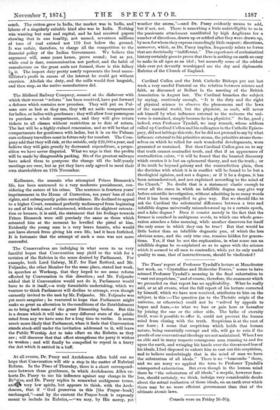Cardinal Cullen and the Irish Catholic Bishops put out last
week a very careful Pastoral on the relation between science and faith, as discussed at Belfast in the meeting -of the British Association in August last. The Cardinal broaches the subject by saying, cautiously enough, "it is the duty and the right of physical science to observe the phenomena and the laws of the material world, but the physicist, as such, -will never ask himself by what influence external to the universe the uni- verse is sustained, simply because he is a physicist." So far, good ; indeed, even Professor Tyndall, we may remark, whose address called up Cardinal Cullen and his colleagues in the Catholic Episco- pacy, did not infringe this rule, for he did not pretend to say by what influence external to his primitive atoms, the primitive atoms them- selves on which he relied for such wonderful developments, were generated or sustained. But then Cardinal Cullen goes on to say that truth cannot contradict truth, and that if an appearance of contradiction exists, "it will be found that the boasted discovery which creates it is but an ephemeral theory, and not the truth ; or if its truth be beyond gainsay and the contradiction plain, then the doctrine with which it is in conflict will be found to be but a. theological opinion, and not a dogma ; or if it be a dogma, it has been misunderstood, and not explained according to the mind of the Church." No doubt that is a statement elastic enough to cover all the cases in which an infallible dogma may give way before scientific investigation, without admitting in so many words that it has been compelled to give way. But we should-like to ask the Cardinal the substantial difference between a true and infallible dogma universally misunderstood up to a certain epoch, and a false dogma ? Does it consist merely in the fact that the former is couched in ambiguous words, to which one whole gene- ration attaches a false meaning, while another discovers for itself the only sense in which they can be true? But that would be little better than an infallible dogmatic pun, of which the less obvious sense, and the only true one, remains hidden for genera- tions. Yet, if that be not the explanation, in what sense can an infallible dogma be re-explained so as to agree with the science which it seemed to all men to contradict, while yet its only useful quality to man, that of instructiveness, should be vindicated?


































 Previous page
Previous page